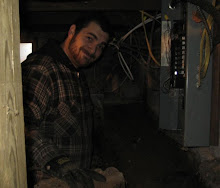I may get a lot of the details wrong, as it's been a while since, and I'm going to simplify this post, so that it will be in very simple and quick terms (and leaving out a lot of detail), and also I will provide some background you may need to understand this otherwise short story.
In some areas of the Dominican Republic, I observed that the relationship between different races are a great deal different then they are here. In the capital, Santa Domingo, things are a bit different then in the poorer places (like where I spent most of my time) in Polo. Out there (usually, not always) if you're Hispanic they regard you as a Dominican, if you're white they think you're a tourist, and if you're black they think that you are a Haitian.
For those of you who aren't too keen on geography, the Dominican Republic shares the island of Hispaniola with Haiti. Dominicans speak Spanish, Haitians speak Creole. Haiti is in very bad shape compared to the Dominican Republic, so a lot of Haitians run the border to find work in the DR, much like Mexicans run the border to find work in the US. However, once the Haitians get in to the DR, they are treated as sub-human. For example: in a flood a while back, hundreds of Haitians died, as well as a few Dominicans, and the local newspapers only reported the Dominican deaths. They usually won't deport the Haitians because businesses love the ultra-cheap labor. (Sound familiar?)
Basically, this gives a lot of the Haitians with a racial inferiority complex, not all too dissimilar from the racial inferiority complex some blacks in the US would have had during the times of slavery and segregation.
I met a fascinating, intelligent and cheerful person from one of the Haitian camps who told me that he had broken free of his previous perception of racial inferiority, and I was curious so I asked for his story . . .
One day when he was working in the hills, he was in a terrible accident (I forgot exactly what he told me happened). His friends flagged down a car to take him to the hospital, and it was a missionary pastor from South Carolina, USA. The pastor took the man to the local hospital (very far away) and by the time they reached it the worker had already lost an incredible amount of blood.
Now, keep in mind, Dominican hospitals are not like the ones in the United States. The doctors are not quite as well trained and the equipment is not exactly as . . . sterile or up-to-date.
The hospital managed to stop the bleeding, but they did not have an untainted source of the right kind of blood to give to the man, and without it, he did not have long to live. The pastor offered to give his own blood, and it was the correct type. Because of this act, the man recovered. The Haitian man was amazed to hear that a white man was willing to give his own blood to him, as the Haitian man perceived that he was sub-human, and believed that the blood was not even compatible.
This one act was of amazing significance, a gift that gave more than life, in a world different from what most people reading this post have ever experienced.
Montgomery College Dinner Theater
17 years ago




No comments:
Post a Comment